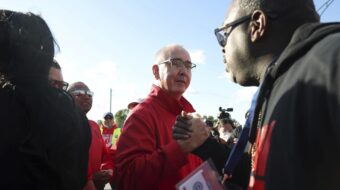
WASHINGTON – Overburdened U.S. diplomats are not pushing the Colombian government to live up to its written commitments on workers’ rights and other rights that Colombia agreed to fulfill to win a so-called “free trade” pact, Colombian and U.S. witnesses told lawmakers on Oct. 24.
As a result, among other problems, there have been no prosecutions of murderers of unionists and union leaders in the Latin American nation in the two years since the treaty, called DR-CAFTA, took effect, AFL-CIO trade specialist Celeste Drake says.
U.S. Embassy personnel respond to reports, from both U.S. and Colombian unions and workers representatives, about death threats, kidnappings, intimidation and more, she said. They present the complaints to their Colombian counterparts, but “they never hear back and we never hear from them again,” Drake said.
That includes the recent murder of Sintrinalgo union leader Juan Carlos Perez Munoz, she added. Neither his union nor the embassy ever got answers to their demands for an investigation.
“But the way to deter threats and violence is swift and effective justice,” she said.
The issue is important to U.S. unions, since Colombia has the lowest rate of unionization, four percent, in the Western Hemisphere, and approximately 3,000 unionists have been murdered in the last two decades of its 50-year civil war. That record didn’t stop the Obama administration from implementing the trade pact.
But Democratic lawmakers set a condition for the pact: That Colombia meet internationally recognized worker rights and human rights standards, and Drake said it’s not. The lack of prosecutions is just the most-notable omission, she added.
In a statement submitted to lawmakers, the Colombian government touted its progress on human rights and economic development, particularly for oppressed Afro-Caribbean Colombians. But it did not mention labor rights. Drake differed.
“If this is success, I’d hate to see what failure would be,” she told Press Associates Union News Service afterwards.
Drake and other witnesses told Congress’ Tom Lantos Human Rights Commission that Colombia’s government, even under presumably more liberal President Juan Manuel Santos, has fallen down on the job in terms of protecting human rights, including worker rights. “It’s deplorable,” Drake said.
And while Colombia’s government is in talks with the main rebel organization, FARC, to end the war, the killings continue. Two days before the hearing, the body of a Medellin-area human rights activist, Diana Marcela Morales Arenas, was found with her throat cut in Batea Seca, a rural area within the municipality of Angostura.
Right-wing paramilitary forces, including those hired by multi-national corporations, have carried out the overwhelming majority of the murders and threats against unionists. Their violence made Colombia the most dangerous nation in the world for union members and activists.
Colombia’s security services and military often aided in the repression, testimony in several court cases and before commissions shows. Recently, the military pushed a law through the Colombian Congress and got Santos to sign it, expanding its internal security power. But on Oct. 23, by a 5-4 vote, Colombia’s Constitutional Court tossed it.
Had the court not done so, “the country would have gone backwards by 30 years,” another witness told lawmakers.
The Colombian DR-CAFTA’s labor side pact also has “no provision at all for union recognition and there’s no process under the law for follow-up” by U.S. officials, Drake testified. “The goal” of worker rights “was good, but there seems to be too many problems of implementation,” she added.
“Local labor negotiators have told our workers that virtually any kind of (worker) sub-contracting” will aid them and meet the side pact’s terms, Drake said. “That’s what the Colombian Department of Labor believes, but workers know better.”
To put teeth into the worker rights promises, Colombia “needs to fix the law and they need to collect the fines” firms now incur for breaking even the Latin American nation’s own weak worker protections, she told PAI later. Those fines total $139 million.
Sympathetic lawmakers sponsoring the hearing promised to put more pressure on Colombia, including through the embassy. “When you’re talking about constructing peace and about negotiations, you’re talking about more actors than just the government and FARC,” said Rep. Jim McGovern, D-Mass., the hearing co-chair.
“We’ll continue to monitor the human rights situation. We’ll continue to pressure the Colombian government where necessary. And we’ll continue to pressure the U.S. government to pressure the Colombian government, where necessary.” They’ll even pressure FARC, when necessary, he added.
Photo: Hundreds of thousands are participating in a national strike in Colombia that has entered its eigth day. Marcha Patriotica/Commondreams.org












Comments